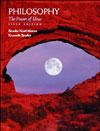 |  Philosophy: The Power of Ideas, 5/e Brooke Moore
Kenneth Bruder
Philosophy and Belief in God
Key ObjectivesUpon completing this chapter you should be able to:
1.State how philosophy of religion differs from religion and theology. |
 |  |  | 2.Explain the basic differences between ontological, teleological, cosmological, and moral arguments for God. |
 |  |  | 3.Describe St. Anselm's ontological argument and Gaunilo's objection to it. |
 |  |  | 4.Describe each of St. Thomas Aquinas' five proofs and state what kind of proof it is. |
 |  |  | 5.Give a brief characterization of what religious mysticism is. |
 |  |  | 6.State Rene Descartes' three proofs and say what kind they are. |
 |  |  | 7.Explain Baron von Leibniz's principle of sufficient reason and show how he uses it to construct a cosmological argument for God. |
 |  |  | 8.Explain why Hume rejected each of the four kinds of argument for God, especially the argument from design. |
 |  |  | 9.Explain why Immanuel Kant rejects the ontological, cosmological, and teleological arguments. |
 |  |  | 10.Explain why Kant thinks it is morally necessary to believe in God. |
 |  |  | 11.Describe Cardinal Newman's argument from conscience. |
 |  |  | 12.Explain why Soren Kierkegaard thought belief in God requires a leap of faith. |
 |  |  | 13.Describe Friedrich Nietzsche's atheism. |
 |  |  | 14.Explain William James' pragmatic argument for God. |
 |  |  | 15.Explain why the logical positivists thought that God-talk is meaningless. |
 |  |  | 16.Describe Mary Daly's feminist alternative to the patriarchal vision of God as Father. |
|



 2002 McGraw-Hill Higher Education
2002 McGraw-Hill Higher Education